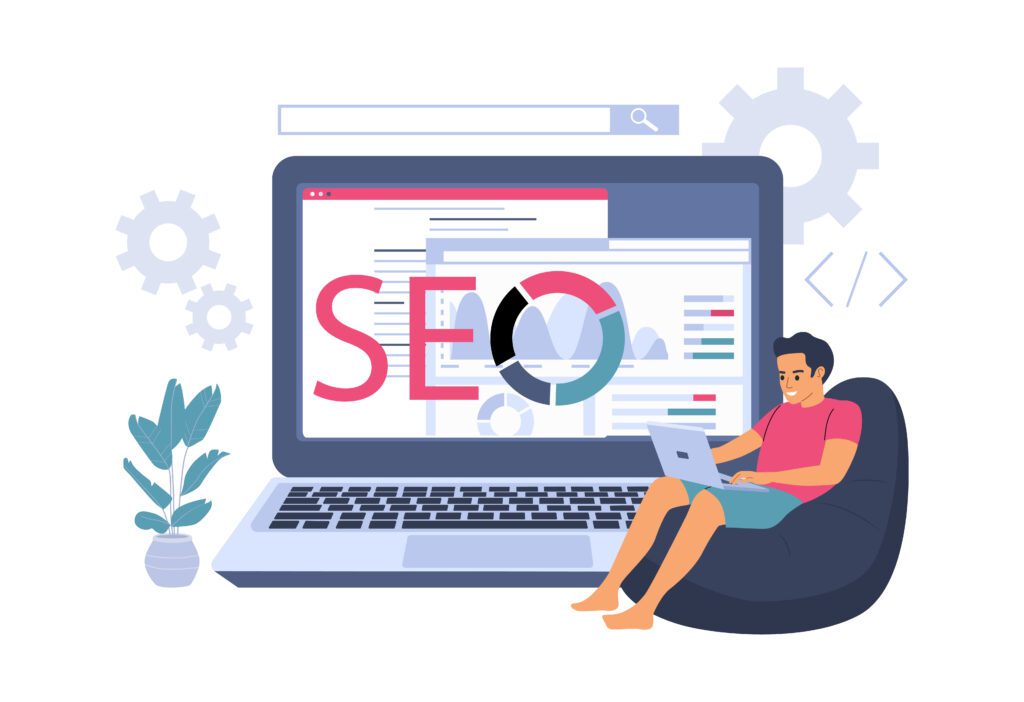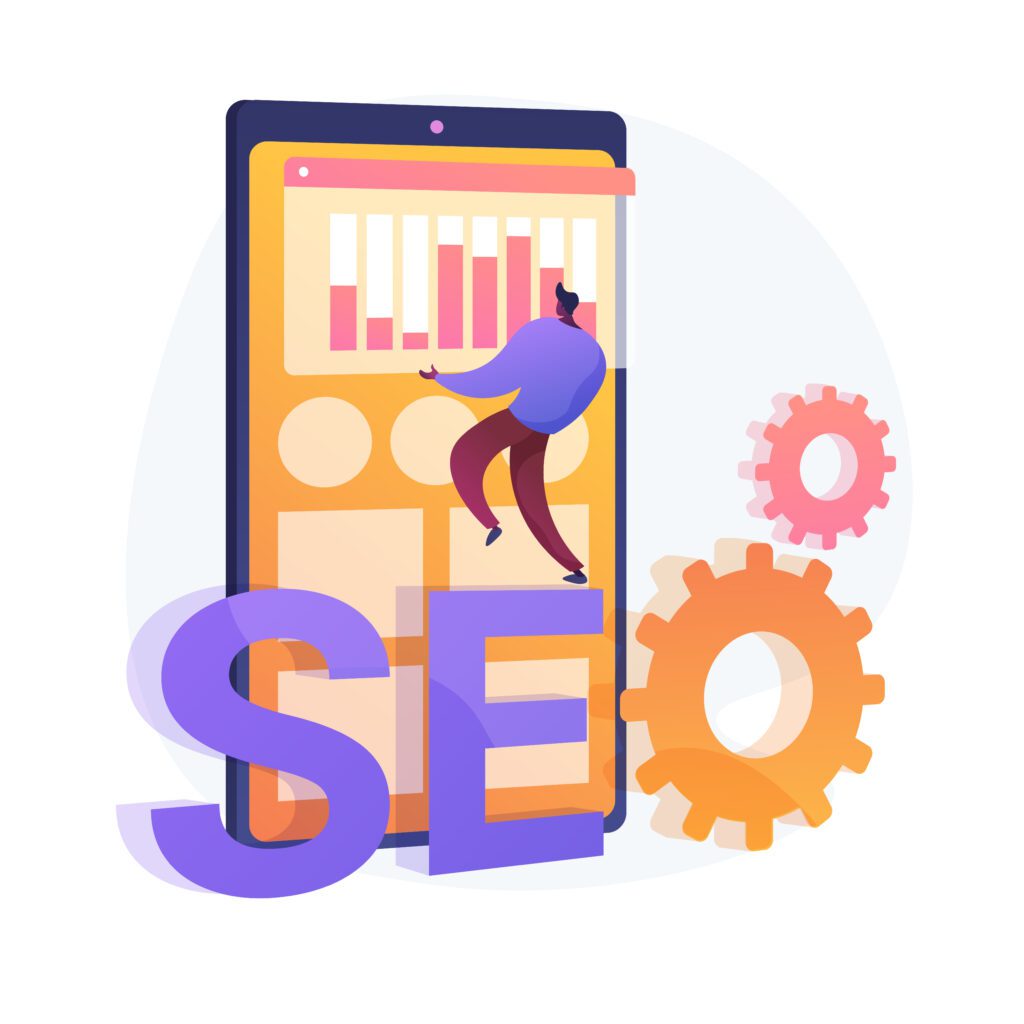In the vast landscape of the internet, where visibility is key, your website’s success hinges on effective Search Engine Optimization (SEO). As you navigate the intricate web of SEO strategies, it’s crucial to steer clear of common pitfalls that can hinder your site’s performance. Let’s delve into the ten most prevalent SEO mistakes and explore how to avoid them.
Table of Contents
Overview About SEO
Search Engine Optimization, commonly known as SEO, is the cornerstone of digital marketing. It’s the art and science of enhancing a website’s visibility on search engines like Google, Bing, and Yahoo. In a world where billions of searches are conducted every day, mastering SEO is pivotal for businesses, content creators, and anyone with an online presence.
The Importance of SEO

Increased Visibility and Traffic
SEO is the key to unlocking greater visibility. Websites appearing on the first page of search results receive the majority of clicks. Effective SEO strategies propel your site to the forefront, ensuring it’s seen by a larger audience.
Credibility and Trust
Users inherently trust websites that appear at the top of search results. SEO not only boosts visibility but also establishes credibility and trust, vital components for user engagement and conversions.
Importance of SEO for website success
In the competitive digital realm, SEO is the compass that guides users to your website. It is the foundation of online visibility and, consequently, the key to reaching your target audience.
Overview of common SEO mistakes
Before we explore the intricacies of SEO blunders, let’s understand the gravity of these mistakes. Overlooking them can result in diminished online presence, decreased traffic, and ultimately, missed opportunities for growth.
Neglecting Keyword Research
Significance of keywords in SEO
Keywords are the heart of SEO. Neglecting thorough keyword research is akin to embarking on a journey without a map. It’s vital to understand your audience’s search habits and integrate relevant keywords seamlessly.
Tools for effective keyword research
To navigate the vast landscape of keywords, utilize tools like Google Keyword Planner, SEMrush, or Ahrefs. These tools provide insights into search volumes, competition, and related terms, aiding in crafting a robust keyword strategy.
Incorporating keywords strategically in content
Once armed with your chosen keywords, strategically integrate them into your content. However, avoid keyword stuffing, as Google‘s algorithms prioritize natural, reader-friendly content.
Ignoring On-Page Optimization
Meta tags and descriptions
Meta tags and descriptions are the unsung heroes of on-page SEO. Craft compelling meta titles and descriptions that accurately represent your content while enticing users to click.
Header tags and their impact
Header tags (H1, H2, H3, etc.) structure your content for both readers and search engines. Utilize them to organize information, making it more digestible and enhancing SEO.
Image optimization for SEO benefits
Optimize images by compressing file sizes and incorporating descriptive alt text. This not only improves page speed but also provides context for search engine algorithms.
Lack of Mobile Optimization

Rise in mobile searches
With the surge in mobile device usage, optimizing your website for mobile is no longer optional. Mobile-friendly websites not only enhance user experience but also receive preferential treatment from search engines.
Importance of mobile-friendly websites
Google prioritizes mobile-first indexing, meaning it predominantly uses the mobile version of the content for indexing and ranking. Ensure responsive design and mobile optimization for optimal SEO performance.
Tips for mobile optimization
Minimize pop-ups, optimize images, and streamline content for smaller screens. Mobile users appreciate a seamless experience, and search engines reward websites that prioritize mobile optimization.
Slow Page Loading Speed
Impact of page speed on SEO
Page loading speed directly influences user experience and SEO rankings. Slow-loading pages frustrate visitors and can lead to increased bounce rates, negatively impacting your site’s visibility.
Tools to measure and improve loading speed
Utilize tools like Google PageSpeed Insights or GTmetrix to assess your website’s loading speed. Implement recommended optimizations, such as browser caching, image compression, and minimizing unnecessary scripts.
Image compression and other techniques
Optimize images without compromising quality by compressing files. Additionally, enable browser caching to reduce load times for returning visitors.
Neglecting Quality Content
Content as the backbone of SEO
Quality content is the linchpin of effective SEO. No amount of optimization can compensate for subpar content. Focus on creating valuable, relevant, and engaging content for your audience.
Balancing keyword usage and quality
While keywords are crucial, ensure they are seamlessly integrated into well-crafted, informative content. Prioritize readability and user experience, striking a balance between SEO optimization and engaging storytelling.
Importance of regular updates
Fresh content signals to search engines that your website is active and relevant. Regularly update and expand your content to stay in the search engine spotlight.
Broken Links and Redirect Issues
Negative effects on user experience
Broken links and faulty redirects frustrate users and harm your website’s credibility. Regularly audit your site for broken links and ensure seamless navigation.
Regular site audits for link maintenance
Implement routine site audits using tools like Screaming Frog or Broken Link Checker to identify and fix broken links promptly. This proactive approach not only improves user experience but also boosts your site’s SEO standing.
Proper handling of redirects
When restructuring your site or updating URLs, implement redirects judiciously. Ensure that old URLs redirect to the new ones seamlessly, preventing users from encountering dead ends and maintaining search engine credibility.
Overlooking Social Media Presence

Role of social signals in SEO
Social media presence is a vital component of a holistic SEO strategy. Search engines consider social signals, such as likes, shares, and comments, as indicators of content relevance and popularity.
Integrating social media into SEO strategy
Share your content across relevant social media platforms. Encourage social engagement, as active and shared content contributes positively to your site’s SEO ranking.
Building a strong online community
Cultivate an online community around your brand. Engage with your audience, respond to comments, and foster a sense of belonging. A thriving community not only enhances your brand but also positively influences SEO.
Inadequate Backlink Strategy
Understanding the value of backlinks
Backlinks are virtual votes of confidence in your content. They signal to search engines that your website is authoritative and trustworthy.
Building high-quality and relevant backlinks
Focus on acquiring backlinks from reputable and relevant sources. Guest posting, influencer collaborations, and creating shareable content are effective strategies for building a robust backlink profile.
Avoiding black-hat SEO practices
Steer clear of unethical practices like buying backlinks or engaging in link schemes. Such shortcuts may provide temporary gains but can result in severe penalties, adversely affecting your site’s long-term SEO health.
Lack of Regular SEO Audits
Importance of periodic site evaluations
SEO is dynamic, and what works today may not be as effective tomorrow. Regularly audit your site’s SEO performance to identify and address emerging issues promptly.
Tools for conducting comprehensive SEO audits
Leverage tools like Google Analytics, Google Search Console, and SEO audit platforms to conduct thorough evaluations. Assess factors like organic traffic, keyword rankings, and user engagement.
Making necessary adjustments based on audit results
Analyze audit results and implement necessary adjustments. Whether it’s updating content, refining keywords, or optimizing technical aspects, proactive measures keep your site in top SEO shape.
Relying Solely on Paid Advertising
Balancing paid and organic strategies
While paid advertising can provide immediate visibility, a sustainable online presence requires a balanced approach. Invest in organic SEO strategies for long-term visibility and credibility.
Long-term benefits of organic SEO
Organic SEO builds a solid foundation that pays dividends over time. Ranking organically signals to users and search engines that your content is relevant and valuable, fostering trust and credibility.
Building a sustainable online presence
Combine paid advertising with a robust content strategy, social media presence, and ethical SEO practices. This comprehensive approach ensures a sustainable online presence that withstands changes in advertising algorithms.
Not Utilizing Local SEO Strategies
Significance of local SEO for businesses
For businesses targeting local audiences, local SEO is indispensable. It enhances visibility in local search results, driving foot traffic and online conversions.
Optimizing Google My Business listing
Claim and optimize your Google My Business listing. Provide accurate business information, including address, phone number, and business hours. Encourage customer reviews, as positive reviews contribute to local SEO rankings.
Encouraging customer reviews for local credibility
Positive reviews not only boost local SEO but also build trust among potential customers. Encourage satisfied customers to leave reviews on platforms like Google, Yelp, and other relevant review sites.
Poorly Structured URL and Site Architecture

Impact on user navigation and experience
A poorly structured URL and site architecture confuse visitors and hinder user experience. Clear and logical structures make navigation intuitive, enhancing user satisfaction and SEO performance.
Best practices for URL structure
Craft SEO-friendly URLs that convey the page’s content. Use hyphens to separate words, keep URLs concise, and avoid unnecessary parameters. A well-structured URL aids search engines in understanding your content hierarchy.
Creating a logical site architecture
Organize your site’s content logically. Use categories and subcategories to create a hierarchy that reflects the relationship between different pages. This not only aids user navigation but also assists search engines in indexing your site accurately.
Failing to Optimize for Voice Search
Rise in voice-activated searches
Voice-activated searches are on the rise, with users increasingly using voice assistants like Siri and Alexa. Optimizing for voice search is essential to stay relevant in evolving search trends.
Strategies for optimizing content for voice
Craft content in a conversational tone, mirroring how users speak. Use long-tail keywords that mimic natural language, addressing the queries users are likely to voice. Consider creating FAQ-style content that aligns with common voice search queries.
Importance of conversational keywords
Traditional keyword optimization may not suffice for voice search. Incorporate conversational keywords and phrases that align with how users naturally articulate queries. This enhances your content’s visibility in voice search results.
Conclusion
Recap of common SEO mistakes
In the dynamic landscape of digital marketing, avoiding common SEO mistakes is pivotal for sustained success. By understanding and rectifying these pitfalls, you pave the way for enhanced visibility, increased traffic, and better user experiences.
Encouragement for proactive SEO practices
Proactive SEO practices, including regular audits, quality content creation, and ethical link-building, are the cornerstones of a successful online presence. Stay informed about industry trends and algorithm updates to adapt your strategy accordingly.
FAQs
How often should I conduct an SEO audit for my website?
Conduct a comprehensive SEO audit at least once every quarter to stay ahead of potential issues and ensure optimal performance.
Can I solely rely on paid advertising for online visibility?
While paid advertising can provide immediate results, a balanced approach with organic SEO ensures long-term sustainability and credibility.
Why is local SEO important for businesses?
Local SEO enhances visibility in local search results, driving both online and offline conversions for businesses targeting local audiences.
How can I optimize my content for voice search?
Optimize content for voice search by using conversational keywords, creating FAQ-style content, and mirroring natural language in your writing.
Is it essential to have a mobile-friendly website for SEO?
Yes, with the increasing use of mobile devices, having a mobile-friendly website is crucial for a positive user experience and better SEO rankings.


